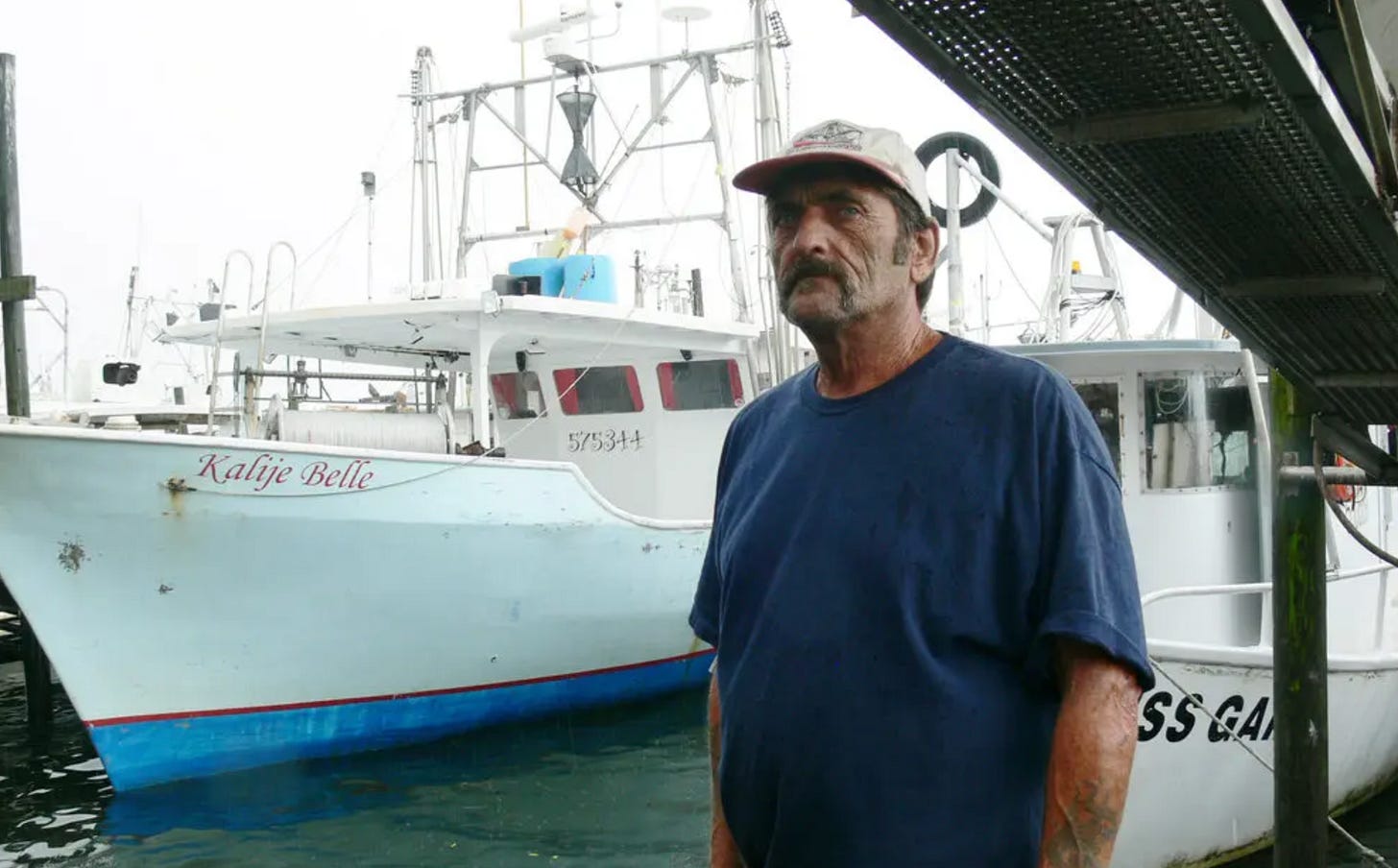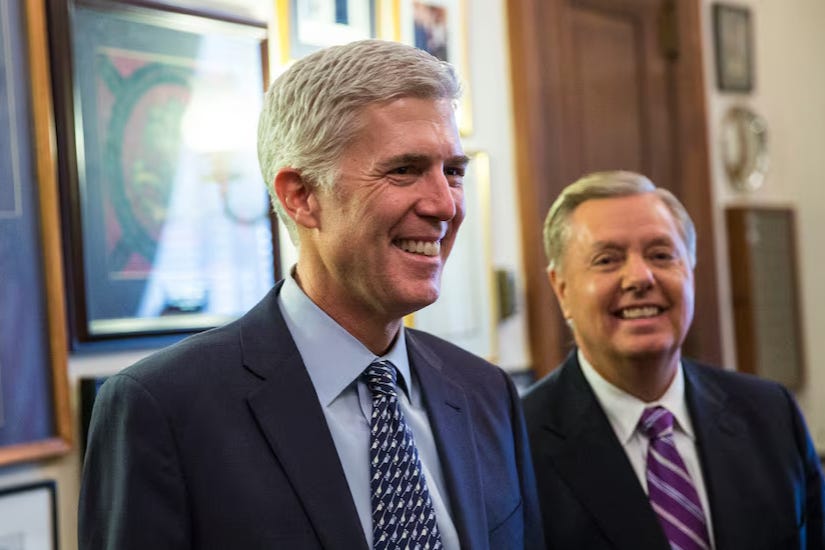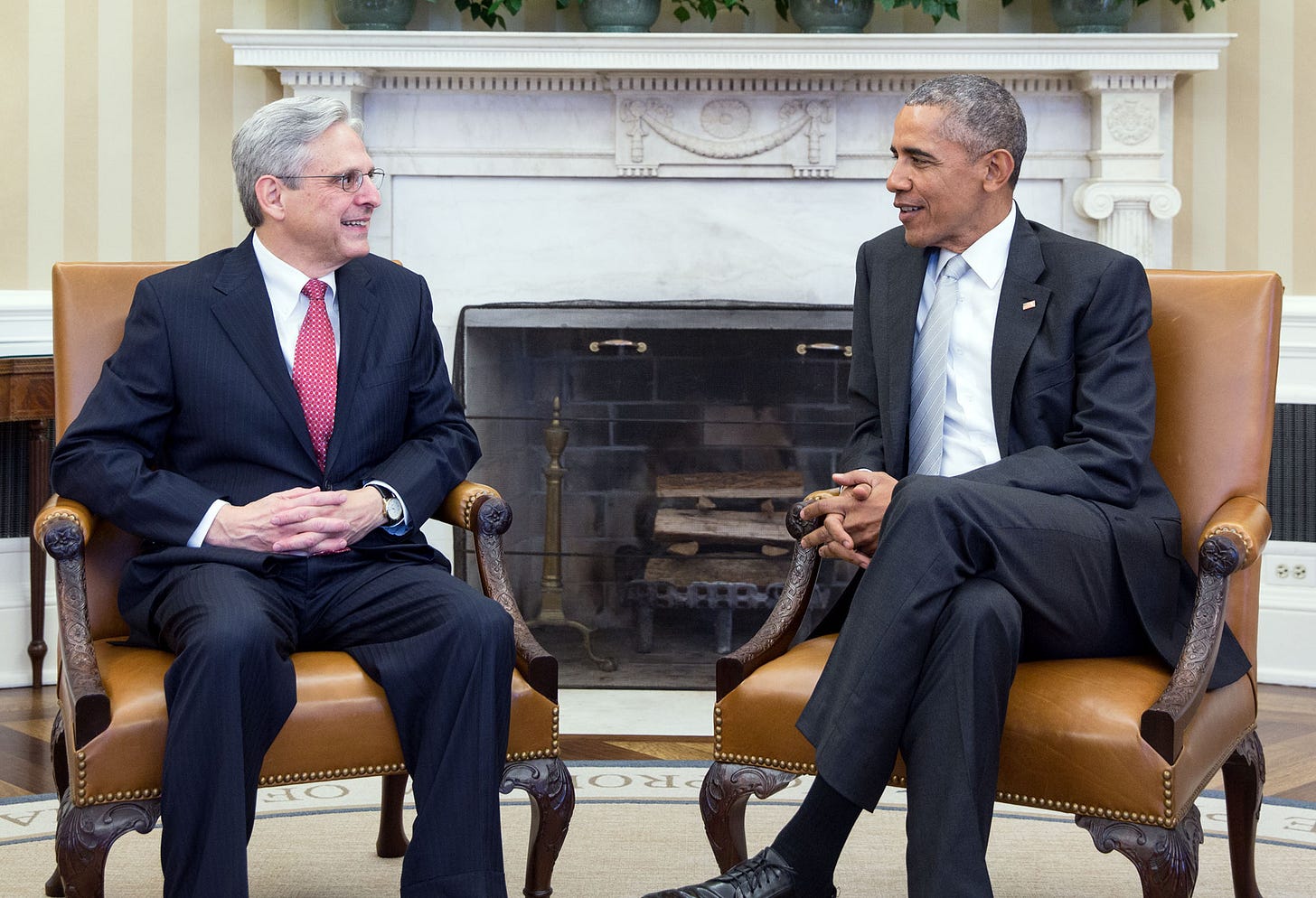Who is Neil Gorsuch?
He says too many laws are ruining lives
There’s a story Neil Gorsuch likes to tell. Sandra Yates was in her house folding laundry one afternoon when seven FBI agents burst through her door, their hands on their guns. Soon after, her husband is being dragged off in handcuffs, accused of destroying evidence in an effort to impede a federal investigation.
John Yates had no idea what they were talking about. He was a commercial fisherman who had worked from deckhand to captain of his own crew. But three years before, a Florida Fish and Wildlife officer boarded his boat while John’s crew was fishing for red grouper. At the time, all red grouper caught and sold by fishermen had to be 20-inches long. The Florida Fish and Wildlife officer measured each fish and found 72 were undersized. He told John to bring them to shore when the crew returned.
When John and his crew docked the boat, the wildlife agent found only 69 undersized fish. John was issued a citation, similar to a speeding ticket, and forgot all about it until the FBI came and took him away. John defended himself by saying the officer had hastily measured the fish, but he lost, and was sentenced to 30 days in jail. He missed Christmas with his wife and his grandchildren. He was forced to wear an ankle monitor when he was released.
John eventually appealed his case to the Supreme Court. He won, but he had already lost his job and was blacklisted in the industry, and he and his wife lost their home. His life, according to him, had been ruined.
This story is one Supreme Court Justice Neil Gorsuch uses to highlight what he sees as legal overreach. He says there are too many laws in America, that the government has gotten too big, and that this is reducing the freedoms Americans enjoy.
So how did a man who wants fewer laws and less government not only become a lawyer himself, but get a lifetime appointment at the highest court in the land?
Welcome to our series on the nine Supreme Court Justices. This week is focused on Neil Gorsuch.
Gorsuch comes from a long line of conservative lawyers in Denver, Colorado, including his grandfather, father, and mother.
He, along with his two siblings, had the type of childhood you’d expect from a family of lawyers, one filled with impromptu debates at the dinner table, while watching political talk shows on Sunday mornings, or in the backseat on the way to school.
Gorsuch liked to show off his debating skills while attending a small private school. A classmate who carpooled with Gorsuch said he was “more mature…better informed, and more advanced” than the rest of the class.
He always had a stack of books with him, but he also spent a lot of time at Rocky Mountain campsites and fishing streams, where he learned that in the wild, it was every man for himself. He preferred a life without anyone — including the government — getting in the way.
When he was nine, a group of local Republicans came to Gorsuch’s house to see if his dad was interested in joining politics. His mom laughed and told them, “You have the wrong Gorsuch.”
Young Neil helped his mom Anne with her campaign for the Colorado House of Representatives, going door-to-door to hand out fliers. After winning, she quickly gained a reputation for never standing down from a political fight — The Rocky Mountain News once said she could “kick a bear to death with her bare feet.”
Anne stood out. She wore fur coats and chain-smoked two packs of Marlboros a day, and was named “Outstanding Freshman Legislator” by her colleagues and the press. That, along with her conservative politics (she worked with a group of lawmakers dubbed the “House Crazies” who wanted to downsize the government, advocating for states rights, and reversing environmental bills), helped her catch the attention of President Reagan. In 1981, Anne was appointed as the first female administrator of the Environmental Protection Agency.
Anne and her children moved to the Washington, DC area while Gorsuch’s father stayed behind, and the couple divorced in 1982. Neil was enrolled at Georgetown Prep, a private school where he quickly became known as a staunch defender of Reagan and his Republican policies.
His interest in politics and public service grew during his time in DC. Then, during his sophomore year, his mother’s tenure at the EPA ended in scandal, and the aftermath changed his outlook.
Anne was at the EPA less than two years. She was a firm believer that the government was too big, too wasteful, and too powerful. So she cut the agency’s budget by 22%, decreased the number of cases the agency filed against polluters, and relaxed regulations surrounding clean air. She wanted to give the power back to the states.
She also hired staffers from industries that the EPA was tasked with regulating. These actions created hostility and low morale in her own agency, but she believed she was following Reagan’s orders of giving the states more power over environmental policies.
Then, Congress launched an investigation into the EPA over allegations the agency mishandled a toxic waste program. Congress told Anne Gorsuch to turn over records, but under the direction of President Reagan, she refused, claiming executive privilege. Her colleagues told the press at the time that this was against Anne’s own wishes. However, she followed Reagan’s orders and became the first agency director in US history to be cited for contempt (or willful disobedience) of Congress.
Anne was pressured to resign, and Neil was furious about it. He told her, “You should never have resigned. You didn’t do anything wrong. You only did what the President ordered. Why are you quitting?”
The experience left a bitter taste in his mouth, and it gave him a strong skepticism of the government. He echoed his mother’s belief that there were too many laws and regulations and that the government was too big.
After seeing her get knocked down, Gorsuch decided that while his goals would be similar to his mother’s — limiting the reach of the government — his approach would be different. Where his mom was demanding and brash, he would be agreeable and kind.
His first step towards public service was senior year in high school, when he was elected president of the student government.
From there, Gorsuch went on to Columbia University in 1985. Once again, he became a well-known conservative voice on campus, starting his own newspaper to highlight right-leaning voices. Along with three other students, Gorsuch named the newspaper The Fed.
He graduated from Columbia in 1988 after only three years, and moved on to Harvard Law School. Gorsuch then got a PhD in law from Oxford University, and returned home with a degree, a wife, and more surprisingly, a horse. While in England, Gorsuch met Louise, a champion equestrian on Oxford’s riding team. They were married a year and a half after their first date.
After school was over, Gorsuch clerked for two Supreme Court justices, Byron White and Anthony Kennedy, before joining a firm that was so new the partners had to run out and buy furniture when a client requested a meeting at the office. Gorsuch shadowed one of the partners, Mark Hansen, a trial lawyer who spent his day in the courtroom.
Though he already believed in limiting big government, it was his time at the firm that taught Gorsuch how laws impacted everyone. In 2005, he started to voice his concern that liberals were relying too much on lawsuits and lawyers to solve their problems.
He wrote, “American liberals have become addicted to the courtroom, relying on judges and lawyers rather than elected leaders and the ballot box, as the primary means of effecting their social agenda…This overweening addiction to the courtroom as the place to debate social policy is bad for the country and bad for the judiciary.”
Like his mother, he was drawn to work in the government, and applied for a job in George W. Bush’s Department of Justice. He was hired as the principal deputy associate attorney general (the third highest position in the DOJ).
Here, he was in charge of civil litigation. But he was quickly nominated by Bush to become a judge on the 10th Circuit Court of Appeals. His nomination was so uncontroversial that only one of 18 senators from the Judiciary Committee showed up to the hearing.
He spent 11 years on the 10th circuit, during which a few of his cases made headlines and illustrated how he viewed the law: Preference for precedent, and limiting government power.
One of those cases was brought by Hobby Lobby, a chain of craft stores with about 13,000 full-time employees. The company sued over a federal law requiring for-profit companies to provide health insurance plans that include birth control coverage, which they objected to for religious reasons. Gorsuch ruled, along with the majority of the 10th circuit, that Hobby Lobby didn’t have to provide birth control coverage (the Supreme Court later agreed, before Gorsuch joined) because they were protected by religious freedom.
His time on the 10th circuit was noticed by conservative groups including the Heritage Foundation and the Federalist Society, both of which floated his name to replace Justice Antonin Scalia, who died in 2017. Gorsuch recalled being in the middle of skiing down a hill in Colorado when he heard the news about Scalia’s death. He said that he couldn’t see the rest of the mountain in front of him through his tears.
Unlike his nomination to the 10th circuit, he faced an uphill battle during his Supreme Court confirmation process. This wasn’t entirely his fault — Scalia died when Barack Obama had 11 months left in his presidency, but Senate Majority Leader Mitch McConnell refused to hold hearings during an election year. Republicans successfully blocked Obama’s nominee, Merrick Garland.
Democrats tried to filibuster Trump’s nomination of Gorsuch. In turn, Republicans moved forward with a so-called “nuclear option.” Since they were in the majority, they were able to change Senate rules so only a simple majority was needed to confirm a Supreme Court justice.
After the dramatic hearings, Gorsuch was confirmed by a vote of 54-45 on April 7, 2017. At 49, he was the youngest nominee to the Supreme Court since 1991.
Since joining the court, he has been a part of its new conservative pendulum swing, overturning the federal right to abortion, voting to end affirmative action, expanding gun rights, restricting efforts to address climate change, and giving presidents broad immunity for official actions.
There is an area where Gorsuch tends to differ from some of his conservative judicial colleagues: protecting Native American rights. Gorsuch is the only justice on the Court who is from the Western part of the United States, and he views protection of tribal status as an originalist viewpoint, because treaties between tribes and the federal government have existed since the inception of the United States.
People who know him say he is a justice who doesn’t care what anyone thinks, he is going to make decisions on the principles he believes are correct.
As the third youngest justice on the bench, he will likely be on the court for decades, and his views, especially those on tribal sovereignty, are likely to be studied by law students of the future.











The real issue with the Yates story is that he was imprisoned for 30 days over a few fish, even though the Eighth Amendment prohibits excessive bails, fines and cruel and unusual punishments. Gorsuch would have us dismantle the laws that attempt to protect the valid interests of society (a sustainable fish population) from the harmful actions of a few (overfishing, even if inadvertent). Instead, he should be addressing the judicial overreach that results in our country having the largest prison population in the world and the highest incarceration rate of any OECD country. Our country has too many people in prisons for having committed misdemeanors, or non-violent felonies.
If Gorsuch really believes in "precedent and limiting government power," he should start giving speeches about the excessive and cruel punishment now facing women and their health care practitioners in many states for taking actions deemed medically necessary to protect the life of a pregnant woman.
I’m assuming that was a typo and Scalia died in 2016?
I find these dives into the justices very interesting indeed; I’ve always wondered how people become what they become and these have been eye opening.
So they wouldn’t replace Scalia in 2016 because it was an election year but it was ok to replace Ginsburg in 2020, also an election year. Got it. 😑